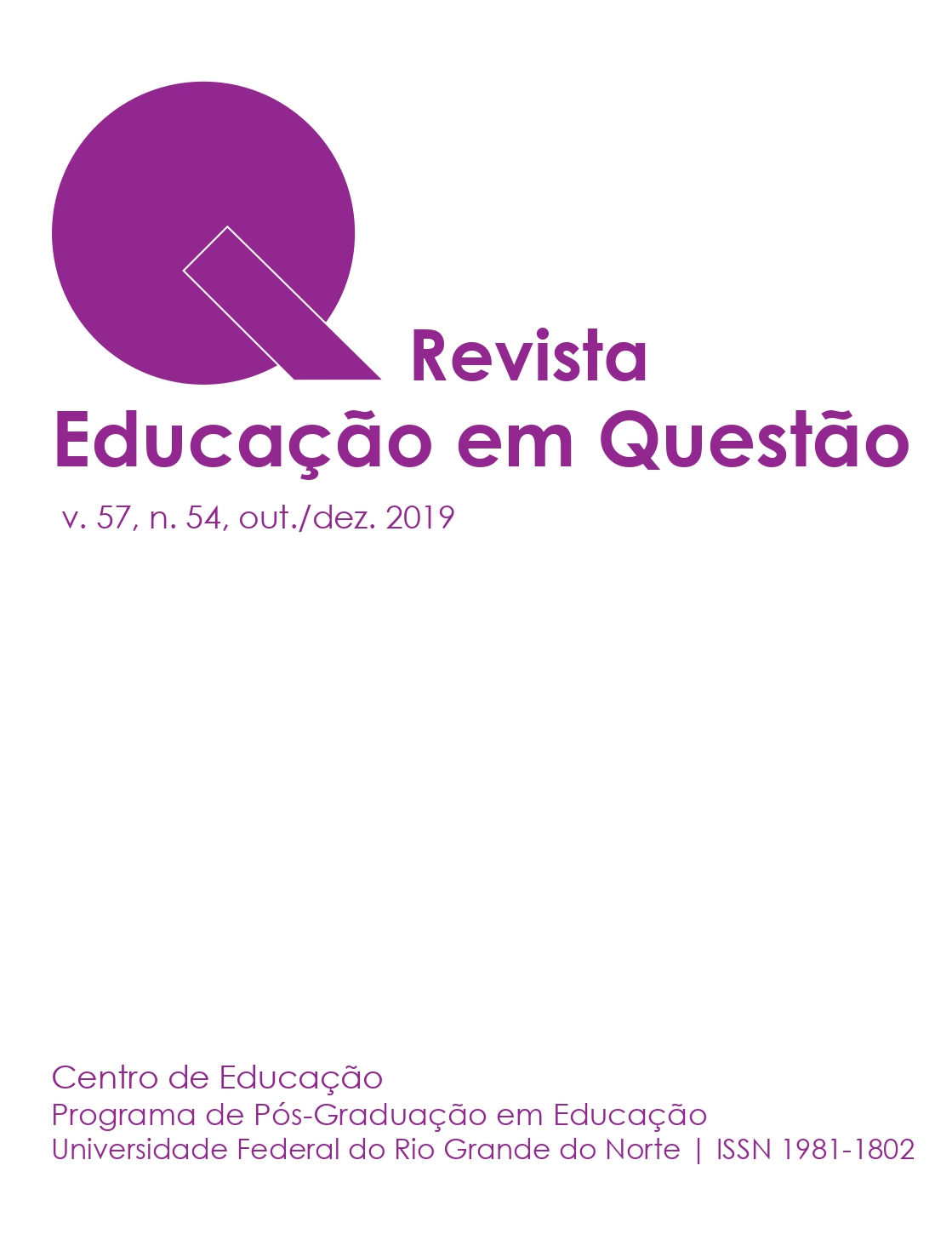Curriculum and epistemological thinking in higher education
DOI:
https://doi.org/10.21680/1981-1802.2019v57n54ID18569Keywords:
Higher Education. Curriculum. Epistemic Thinking. Students.Abstract
This article presents a theoretical analysis on the implications of the curriculum configurations in the context of higher education, with the goal of elaborating a set of curriculum propositions for the development of students’ epistemic thinking in undergraduate courses. The theoretical foundation is particularly based on the studies of Perry (1970), Hofer (2001) and Schommer (1990). The methodological development of this paper is based on the integrative research approach, originally proposed by Cooper (1984), which makes it possible to elaborate a set of theoretical propositions from a corpus of research on a certain theme. The study begins by examining the concept of epistemological thinking in the context of higher education. Then, it elaborates and analyzes a set of curriculum propositions to support the development of students' epistemic thinking. The findings highlight the importance that the curriculum comprises activities which encourage students to explore concepts from different perspectives and develop independent thinking, which enables open and project-based learning, involve argument building and open-ended assessment.
Downloads
References
AHOLA, Salla. Measurement issues in studying personal epistemology. Psychology & Society, online, v. 2, n. 2, p. 184–191, 2009. Disponível em : http://www.psychologyandsociety.org/__assets/__original/2009/11/Ahola.pdf. Acesso em: 10 ago. 2019.
BAUMAN, Zygmunt. Intimations of postmodernity. London: Routledge, 1992.
BAXTER MAGOLDA, Marcia. Students’ epistemologies and academic experiences: implications for pedagogy. The Review of Higher Education, Las Vegas, v. 15, n. 3, p. 265-287, Spring 1992.
BRATEN, Ivar. Personal epistemology, understanding of multiple texts, and learning within internet technologies. In: KHIN, Myint (ed.). Knowing, knowledge and beliefs: epistemological studies across diverse cultures. New York: Springer, 2008. p. 351-376.
BREM, Sara. K.; RUSSELL, Janet; WEEMS, Lisa. Science on the web: student evaluations of scientific arguments. Discourse Processes, Saint Joseph, v. 32, n. 2 e 3, p. 191-213, 2001.
COOPER, Harris. Integrating research. Newbury Park: Sage, 1984.
EDMONDSON, Katherine; NOVAK, Joseph. The interplay of scientific epistemological views, learning strategies, and attitudes of college students. Journal of Research in Science Teaching, Reston, v. 30, n. 6, p. 547–559, 1993.
GLASS, Anna. The state of higher education 2014. Paris: OECD, 2014.
HOFER, B. Personal epistemology research: implications for learning and teaching. Journal of Educational Psychology Review, online, v. 13, n. 4, p. 353-383, 2001. Disponível em: https://link.springer.com/article/10.1023/A%3A1011965830686. Acesso em: 10 ago. 2019.
HOFER, Barbara. Epistemological beliefs and first-year college students: motivation and cognition in different instructional contexts. In: ANNUAL MEETING OF THE AMERICAN PSYCHOLOGICAL ASSOCIATION - APA, 102., 1994, Los Angeles. Proceedings [...] Washington: APA, 1994. p. 1-25.
HOFER, Barbara; PINTRICH, Paul (ed.). Personal epistemology: the psychology of beliefs about knowledge and knowing. Mahwah: Erlbaum, 2002.
HOFER, Barbara; PINTRICH, Paul The development of epistemological theories: beliefs about knowledge and knowing and their relation to learning. Review of Educational Research, Washington, v. 67, n. 1, p. 88–140, 1997.
KING, Patricia; KITCHENER, Karen. Reflective judgment: theory and research on the development of epistemic assumptions through adulthood. Educational Psychologist, London, v. 39, p. 5–18, 2004.
KING, Patricia; KITCHENER, Karen. The development of reflective thinking in the college years: the mixed results. New Directions for Higher Education, San Francisco, n. 84, p. 25-42, Winter 1993.
MOORE, William. Student and faculty epistemology in the college classroom. In: PRICHARD, Keith; SAWYER, Mclaran (ed.). Handbook of college teaching: theory and applications. Westport: Greenwood Press, 1994. p. 45-76.
PALMER, Betsy; MARRA, Rose. College student epistemological perspectives across knowledge domains: a proposed grounded theory. The International Journal of Higher Education Research, Amsterdam, v. 47, p. 311–335, 2004.
PEDRA, José Alberto. Currículo e conhecimento: níveis de seleção do conteúdo. Em Aberto, v. 12, n. 58, p. 30-37, abr./jun. 1993.
PERRY, William. Cognitive and ethical growth: the making of meaning. In: CHICKERING, Arthur (ed.). The modern American college. San Francisco: Jossey-Bass, 1981. p. 76-116.
PERRY, William. Forms of intellectual and ethical development in the college years: A scheme. New York: Holt, Rinehart & Winston, 1970.
PERRY, William. Patterns of development in thought and values of students in a liberal arts college: a validation of a scheme. Cambridge: Harvard University Press, 1968.
PINAR, William. What is a curriculum theory? Mahwah: Lawrence Erlbaum, 2004.
RYAN, Michael. Monitoring text comprehension: individual differences in epistemological standards. Journal of Educational Psychology, Washington, v. 76, n. 2, p. 248-258, 1984.
SCARDAMALIA, Marlene; BEREITER, Carl. Knowledge building: theory, pedagogy, and technology. In: SAWYER, K. (Ed.). Cambridge handbook of the learning sciences. New York: Cambridge University Press, 2006. p. 97-118.
SCHOMMER, Marlene. Comparisons of beliefs about the nature of knowledge and learning among postsecondary students. Research in Higher Education, Ponte Vedra Beach, v. 34, p. 355-370, 1993.
SCHOMMER, Marlene. The effects of beliefs about the nature of knowledge on comprehension. Journal of Educational Psychology, Washington, v. 82, n. 3, p. 498-504, 1990.
SCHOMMER, Marlene. Student beliefs about the nature of knowledge: what are they and how do they affect comprehension. Urbana: Center for the Study of Reading, 1989.
SCHOMMER-AIKINSA, Marlene; EASTER, Marylin. Ways of knowing and epistemological beliefs: combined effect on academic performance. Educational Psychology, London, v. 26, n. 3, p. 411–423, June 2006.
SILVA, Tomaz. Tadeu da. Documentos de identidade: uma introdução a teoria dos currículos. Belo Horizonte: Autêntica, 1999.
YOUNG, Mark. Personal epistemological beliefs and their relationship to learning. Journal for Advancement of Marketing Education, online, v. 6, p. 63-76, Summer 2005. Disponível em: http://www.mmaglobal.org/publications/JAME/JAME-Issues/JAME-2005-Vol06-Issue1/JAME-2005-Vol06-Issue1-Young-pp63-76.pdf. Acesso em: 10 ago. 2019.
Downloads
Published
How to Cite
Issue
Section
License
The Journal Education in Question shall retain the copyright in all articles that it publishes.
The authors and co-authors of articles and book reviews, published in the Journal Education in Question, shall wait for at least 1 (one) year before they are allowed to submit new works for publication.






